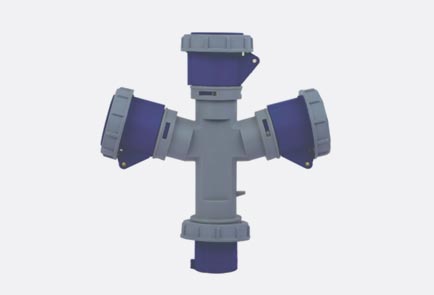In industrial environments, electrical safety is of vital importance. As a key component connecting power supply and electrical equipment, the safety protection performance of industrial plugs and sockets is directly related to the stable operation of the entire system and the safety of personnel.

The shell of industrial plugs and sockets should be made of high-strength and impact-resistant materials, such as high-quality metal alloys or engineering plastics. High-strength shells can effectively resist mechanical shock, collision and external force extrusion, prevent the exposure of internal components and the risk of short circuit caused by shell damage, thereby ensuring the safety of electrical connections.
In view of the common humid and dusty conditions in industrial environments, industrial plugs and sockets should have excellent waterproof and dustproof performance. By adopting sealing structures, waterproof gaskets and dustproof filters, impurities such as moisture and dust can be effectively blocked from entering the socket, preventing electrical failures and short circuits caused by moisture or pollution.
The complexity of the industrial environment requires that the shell material of the plug and socket have good corrosion resistance, weather resistance and aging resistance. Selecting shell materials that can resist acid and alkali corrosion, ultraviolet radiation and extreme temperature changes can ensure that the plug and socket can still operate stably in harsh environments and extend the service life.
As a key component of the electrical connection between the plug and the socket, the wear resistance of the pin is crucial. High-quality wear-resistant pins can withstand the test of frequent plugging and unplugging, reducing safety hazards such as poor contact, heating and even sparking caused by pin wear. Therefore, when choosing industrial plugs and sockets, attention should be paid to the material and process level of the pin.
The quality of the conductive contact components directly affects the stability and reliability of the electrical connection. High-quality conductive contacts should be made of metal materials with high conductivity and low resistivity, and should be finely processed and surface treated to ensure good contact performance and corrosion resistance. In addition, the design of the contact should also take into account characteristics such as easy plugging and unplugging and self-cleaning.
To ensure the safe operation of industrial plugs and sockets, it is necessary to ensure that the specifications of the selected plugs and sockets match the current requirements of the electrical equipment. Too small specifications may cause overload operation, heating or even fire; too large specifications may cause waste of resources and unnecessary cost expenditure. Therefore, when choosing plugs and sockets, you should carefully check their rated current and voltage and other parameters.
Choose professionally certified products. Professional certification agencies will strictly control the design, production, testing and other aspects of the products to ensure that the products meet relevant safety standards and specifications. Our company's industrial plugs and sockets have passed professional certifications such as UL, CE, and CCC, which is an important way to ensure their safety protection performance.
Even if you choose high-quality industrial plug and socket products, you cannot ignore their daily inspection and maintenance work. Regularly check whether the shell of the plug and socket is intact, whether the pins are worn, whether the contacts are clean, etc., and replace damaged parts and repair faulty equipment in time, which can effectively prevent electrical failures and safety accidents.
In summary, by adopting high-strength casing, waterproof and dustproof design, environmentally resistant casing, wear-resistant pins, high-quality conductive contact components, specification and current matching, professional certification, and regular inspection and maintenance, the safety protection performance of industrial plugs and sockets can be significantly improved to ensure the stable operation of industrial electrical systems and personnel safety.
GET A QUOTE